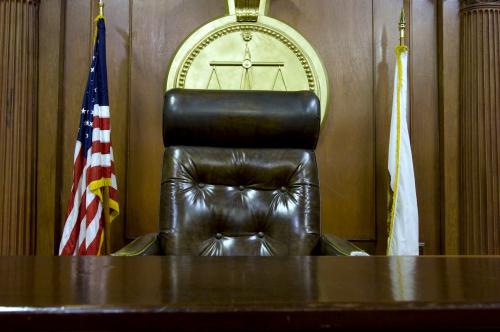One of the many strategies that could be used to confuse and delay the results of the 2024 election is the refusal to certify elections, particularly at the county level. We have already seen this tried in places like Cochise County, Arizona in 2022 and Washoe County, Nevada in 2024, and similar efforts seem to be percolating now in counties across the nation. It failed in those places and elsewhere but may be tried again in November. Counting the votes is a ministerial duty and not one that involves discretion by county election officials as we explained in the first essay in this series. Nonetheless, the election subversion movement has seized on this strategy as a vehicle to attempt to sabotage results or confidence in them, to sow chaos or simply to vent spleen.
In this essay, we examine the 50 counties across the seven swing states that pose the highest risk of attempting non-certification in November, however futile. In Section I we provide a table grouping them in four categories based on the degree of risk of attempted non-certification: high concern (Tier 1), medium concern (Tier 2), concern (Tier 3), and worth watching (Tier 4). In Section II, we offer a more detailed discussion of the 15 high- and medium- concern counties. In Section III, we offer state-by-state maps visualizing the location of these counties.
To rank risk, we primarily considered county-by-county factors, including whether there is a recent history of non-certification, whether the county election officials currently on the board have a record of voting against certification, and whether these officials form the majority of the county election body.1
We also took into account state-level developments that directly impact the county-level process. For example, Michigan counties were weighted relatively lower risk than those in other states following Senate Bill 529, which went into effect on February 13, 2024. It clarifies that certification is a ministerial, clerical, and nondiscretionary duty. It also states that the board must canvass all votes. Georgia counties, on the other hand, were weighted relatively higher risk due to a recent slew of proposed changes by the State Election Board which could undermine the certification process—a number of which are now facing litigation challenges (and have been struck down, though appeals are expected).
For an overview of the county certification process in general, see the first essay in this series. In this essay, we ordered counties in the chart within each category alphabetically; given the degree of uncertainty associated with predicted future events, rankings within each category are uncertain. Links to each county board’s website are included.
High-concern counties (Tier 1)
Eleven counties located across four states—Arizona, Georgia, Nevada, and Pennsylvania—pose a relatively higher risk of attempts at non-certification in the November 2024 election. Each county has distinct features constituting reasons for concern. But most of these counties have election boards in which the majority of the members have indicated that they may be open to interfering with certification this November.
Three Pennsylvania counties, Lancaster, Fayette, and Berks required court-ordered compliance to force certification in 2022. Each of these counties saw two out of three members refuse to certify primary results in that cycle.2 In Fayette and Lancaster, the boards of elections certified only a portion of the vote totals, excluding ballots that were received on time but did not have handwritten dates. A court successfully intervened in both counties to order compliance. In Berks, the board refused to certify due to a desire to exclude undated mail-in ballots. There, too, a court ordered compliance. The officials who refused certification still sit on the election boards and hold the majority.
Washoe County, Nevada, is the only county in this analysis with four prior attempts at delay: the 2020 general election, the 2022 primary election, the 2022 general election, and the 2024 primary election. Already in 2024, three out of five board members initially refused to certify the results of a recount in two June primary elections.3 After the Nevada Secretary of State asked a court to compel the board to certify, two of those three relented and ultimately voted to certify the recounts. The three members involved remain on the county board. This pattern of prior non-certification elevates the potential risk of failing to certify in Washoe this November.
In Cochise County, Arizona, two of the three current members of the county board of supervisors have demonstrated a propensity for delaying certification, even at the risk of criminal penalties. In 2022, board members Tom Crosby and Peggy Judd succeeded by a 2-1 vote in delaying certification of the county’s general election results. The Arizona Secretary of the State and an advocacy group filed petitions for a writ of mandamus—asking the court to order the officials to fulfill their duty to certify. Only after the Superior Court of Arizona in Cochise County issued such an order did the board meet and certify the election results. Based on this conduct, Crosby and Judd were indicted in 2023 and, though Judd pleaded guilty in October of 2024, both Crosby and Judd remain on the Cochise County board.
In another Arizona county, Mohave, two board members initially voted against certification in the 2020 general election and three did so in the 2022 general election. Though they ultimately voted to certify, two board members in 2022 claimed to do so “under duress.” A third member voted to delay 2022 certification though ultimately voted to certify. These three form the majority of the current board.4
In Bradford County, Pennsylvania, two county commissioners on the three-member board have previously refused to certify all legal votes. They voted to certify results in 2022 but excluding ballots that had undated return envelopes. Only after state pressure did they submit a document describing the uncertified ballots to the state. Doug McLinko, who has been in office since 2015, and who attended the January 6 insurrection, has “said proudly that he voted against certifying the 2020 election.” He stated in 2022 that “Donald Trump Did Not Lose Pennsylvania. He Did Not Lose Pennsylvania,” and met with the former president at Trump Tower in 2022 to discuss how “messed up the voting” in Pennsylvania is. Another commissioner published an op-ed undermining confidence in elections in the immediate aftermath of 2020.
While only two members on the five-member board in Georgia’s Fulton County have previously refused certification, there are several factors that nonetheless elevate Fulton County to the highest non-certification risk category. Julie Adams, one of the two election deniers on the board, is “a leader” of the Election Integrity Network, a group that is associated with election-denying officials and run by Trump advisor Cleta Mitchell, who was on the notorious call when then-President Trump asked Georgia Secretary of State Raffensperger “to find 11,780 votes” on January 2, 2021. Adams recently sued (and lost) a Fulton County case arguing she had discretion to refuse to certify votes. The second election denier on the board, Michael Heekin, voted with Adams against certifying the 2024 presidential primary. Heekin also proposed an anti-voting rule change to the State Elections Board (SEB) that was adopted on August 6 by a 3-2 vote. Heekin’s coordination with the SEB along with the SEB’s dubious efforts are concerning signs.
On the county elections boards in Georgia’s Gwinnett and DeKalb counties, there are also two officials who have previously voted against certification. Though these officials do not constitute majorities on the five-member election boards, David Hancock from Gwinnett and Nancy Jester from DeKalb also seem to be linked to a network of election-denying officials. In addition, Hancock coordinated with the State Election Board on its extreme new rules (some of which have been enjoined by Georgia courts).
In Allegheny County, Pennsylvania, one of the three board members is an election denier who voted against certification in 2020 and served as a false elector. However, the county poses additional risks due to several factors. The board voted to delay certification in 2022 for 12 precincts following election denial groups in Pennsylvania seeking hand recounts. The county has also been a target for continued mass voter challenges, including in recent lawsuits.
Medium-concern counties (Tier 2)
Though they do not pose quite as severe of a non-certification risk as the counties above, four counties—located across Georgia, Michigan, Nevada, and Pennsylvania—still pose a risk of non-certification this November.
Although Michigan recently passed Senate Bill 529, providing strong remedies to compel counties to certify, there remains the potential for disruption and delay if a majority on a county election board votes against certification. In Wayne County, two of the four election board members have publicly cast doubt on the legitimacy of the 2020 election. Wayne County, which is the most populous county in Michigan, was an epicenter of efforts to interfere with the certification of the state’s election results in 2020. In the last presidential election, two then-members of the Wayne County election board voted against certification and produced a 2-2 deadlock—a situation we could see repeated after the upcoming election.5
In recent years, majorities on the county election boards in two Pennsylvania counties, Butler and Luzerne, have successfully delayed certification. In Butler County, the board decided only to certify some of the ballots cast in the 2022 primary—they refused to include undated mail-in ballots, defying an appeals court ruling in a similar dispute earlier that year that undated ballots must be counted. Two of the officials from the 2022 election board remain in their offices.6 The Butler County Board of Election is embroiled in a lawsuit challenging its refusal to count another type of mail-in ballot, “naked ballots” (which are returned without the outer secrecy envelope). In Luzerne County as well, two members who voted not to certify in the past remain on the election board.7 Luzerne has also faced lawsuits over its election practices.
In Nye County, Nevada, four of the five election board members have publicly expressed election skepticism.8 One of them, Donna Cox, voted against certifying the 2022 primary results. In addition to a concerning record of election denialism, the Nye County board of elections in 2022 unanimously endorsed hand-counting of paper ballots in place of voting machines, a policy that is inefficient and inaccurate but has been increasingly pushed in jurisdictions across the country since 2020. The hand-counting effort turned out to be time-consuming and inaccurate.
Remaining counties of concern (Tiers 3 and 4)
For the remaining 35 counties, we identified at least some indications of concern for non-certification, though these factors are less likely to result in significant disruptions than in the counties above. Among the eight counties of concern in Tier 3, some have a majority of members on the county election boards who have made election denialist statements or promoted unfounded claims of fraud, though most of these members have not gone so far as to vote against certification.9 Others have one or two county election officials who have voted against certifying votes, but those members appear unlikely to muster majorities on the election boards in these counties.10 Four Georgia counties were flagged in Tier 3 for a mix of factors, notably including links to recent election denialist movements (like Coffee County, which was a hotspot for efforts to overturn the 2020 presidential election).11
Many of the remaining 27 counties that are worth observing feature only one election board member who either has a history of voting against certification or is a new member who has demonstrated a propensity for election denialism. Of course, one member does not make up a majority, but the presence of such individuals on county boards produces some risk—it is possible for instance that one election denier could convince others on the board to delay certification or work other mischief.12 In addition, seven Georgia counties (including Troup above) are worth monitoring because, since 2020, their county election boards have been restructured due to a push by the state legislature to shift the power to appoint county election officials to partisan county commissioners.13 In Troup County, for example, four Democrats, including two Black women, were removed from the board during its 2021 restructuring.
Efforts to block certification have all ultimately failed in the past. Nevertheless, we could see similar tactics in multiple counties this November. Although these attempts will likely meet the same fate as prior efforts, they could still stoke uncertainty and distrust. Before, during, and after Nov. 5, the situation should therefore be closely monitored—and appropriate election protection and anti-sabotage measures taken. Those responses have worked before and remain powerful.
A visualization of the top 50 counties that present risk of non-certification can be seen below mapped by state. Viewing the counties through this lens offers additional insights. For example, we see in some states a cluster of counties that pose risk. In Georgia, counties that pose the highest risk are clustered around the Atlanta metro area. The same is true in Pennsylvania around the Pittsburgh metro area. These maps can be seen by using the button menu below.
-
Footnotes
- To identify the 50 counties that pose risk of non-certification in the seven swing states, we searched public records, media reports and the following reports and datasets: CREW Election Certification Under Threat Report, Public Wise Election Threat Index, Protect Democracy Report, Informing Democracy Database, democracyFIRST PA Report, Votebeat PA List, and Center for Media and Democracy Swing State Election Deniers. Fifty counties were selected based on the following criteria. All counties in which a majority of the county election board voted against certification were included. Other counties were included if at least two of the following criteria were satisfied: At least one current member of the county election body has voted against certification in the past; at least one former member of the body has voted against certification; at least one new county election official who has not yet certified an election has a demonstrated propensity for election denialism; and the county has a history of election-denial related litigation. We sorted those counties quantitatively, then made modifications after qualitative analysis.
- In Lancaster, these officials were Ray D’Agostino and Joshua Parsons. In Fayette, they were Scott Dunn and David Lohr; in Berks, Christian Leinbach and Michael Rivera.
- These three members are Jeanne Herman, Michael Clark, and Clara Andriola.
- These three officials are Ron Gould, Hildy Angius, and Travis Lingenfelter.
- Katherine Riley and Robert Boyd are new members of the board who have questioned the results of the 2020 election.
- Flagged officials are Leslie Osche and Kimberly Geyer.
- These officials are Alyssa Fusaro and Daniel Schramm.
- Those officials are Donna Cox, Frank Carbone, Bruce Jabbour, and Debra Stickland.
- In Schuylkill County, Pennsylvania, two of the three board members have expressed election denial. On the five-member election boards of Elko County, Nevada and Spalding County, Georgia, respectively, one member has voted against certification and two others have been flagged as election deniers. In Westmoreland County, Pennsylvania two of the three officials have demonstrated hostility to mail-in voting.
- Mecklenburg County, North Carolina and Elko County, Nevada fall into this category. Spalding County, Georgia, has this make-up in addition to fitting into the category explained in footnote 9.
- Coffee County, Ware County, Pickens County, and Spalding County, Georgia.
- In Northampton County, Pennsylvania, there are two flagged officials (one who has voted against certification in the past), which nonetheless constitutes a minority on the board. Kalamazoo County, Michigan, has one official who has verbally threatened non-certification, but that official has signed an affidavit to certify the results following a suit filed by the ACLU.
- Ben Hill, Columbia, Lincoln, Montgomery, Morgan, Troup, and Wilkes Counties, Georgia.
The Brookings Institution is committed to quality, independence, and impact.
We are supported by a diverse array of funders. In line with our values and policies, each Brookings publication represents the sole views of its author(s).










